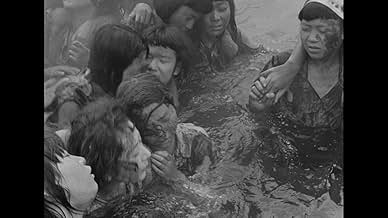Racconto brillante ed estremamente realistico del giorno in cui è caduta la bomba a Hiroshima e dei giorni successivi.Racconto brillante ed estremamente realistico del giorno in cui è caduta la bomba a Hiroshima e dei giorni successivi.Racconto brillante ed estremamente realistico del giorno in cui è caduta la bomba a Hiroshima e dei giorni successivi.
- Regia
- Sceneggiatura
- Star
Recensioni in evidenza
I'm not sure the Teacher's Union got what they wanted out of this movie; the trouble with directors is they go off and make the movie they want instead of the one you want. In any case, some of the sequences looked like modern 'slow zombie' movies, except they seemed much more real and terrifying. The union did not make a third movie. Perhaps they ran out of money.
Lo sapevi?
- QuizMore than 100,000 people acted as extras without pay in the making of the film, most of whom were Hiroshima locals, and many of whom had lost friends or family in, or had even personally survived, the bombing.
- Citazioni
Narrator: For a moment, the navigator forgot he was in a war and gave himself over to his thoughts. He suddenly remembered what was about to happen to the people of Hiroshima. His mission was bringing doom to those people. The "gadget" in the belly of his plane was a weapon far beyond imagination. It was an atomic bomb. The 20th Century had seen the advent of a bomb powerful enough to kill every human being within a kilometer of its blast center. Worse still, the radioactivity from the bomb would do incalculable damage to all living creatures in the vicinity. Hiroshima would instantly become a city of corpses. That thought led Van Krik to a feeling of utter emptiness. Overwhelmed by sadness, desperate for something to cling to, he suddenly recalled his mother's face.
- Versioni alternativeThere is an Italian edition of this film on DVD, distributed by DNA Srl: "HIROSHIMA (1953) + LE CAMPANE DI NAGASAKI (1950)" (2 Films on a single DVD), re-edited with the contribution of film historian Riccardo Cusin. This version is also available for streaming on some platforms.
- ConnessioniFeatured in Hiroshima mon amour (1959)
I più visti
- How long is Hiroshima?Powered by Alexa
Dettagli
Botteghino
- Budget
- 240.000 USD (previsto)
- Tempo di esecuzione1 ora 44 minuti
- Colore
- Mix di suoni
- Proporzioni
- 1.37 : 1
Contribuisci a questa pagina

























